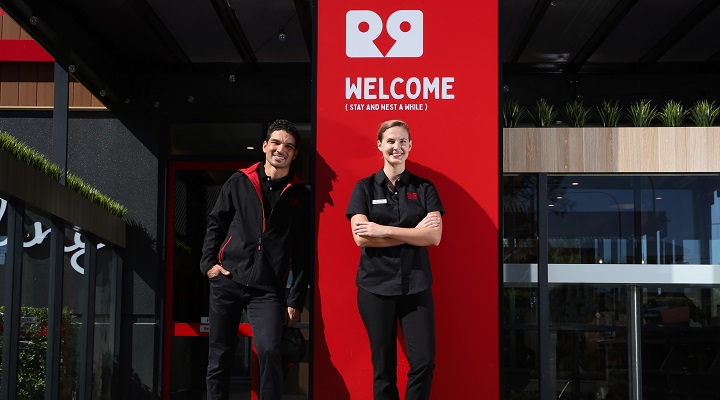Craveable Brands, the company behind Red Rooster, Oporto and Chicken Treat, has become one of just 250 organisations in Australia, and the only one in the quick-service restaurant (QSR) industry, to formally commit to the goal of reconciliation through a reconciliation action plan (RAP). A RAP is a publicly accessible document detailing how a workplace plans to advance reconciliation by building stronger relationships between non-Indigenous and Aboriginal and Torres Strait Islander people based
ed on mutual understanding and respect.
There are four different types of RAPs – Reflect, Innovate, Stretch and Elevate – tailored to businesses at different stages of the reconciliation journey, and they must be reviewed and formally endorsed by Reconciliation Australia to be accredited.
Craveable Brands’ Reflect RAP was endorsed by Reconciliation Australia earlier this month and will be officially launched with smoking ceremonies in company offices around the country on 7 June.
The response from staff has been overwhelmingly positive, Craveable Brands’ chief people officer Kathryn Farnell told Inside Retail.
“We’ve had people from all different backgrounds come forward to us and say this is really important,” she said. “They’ve seen how other countries around the world embrace [diversity] and they want to see better integration and better pathways to reconciliation in our country.”
The RAP is just the latest example of Craveable Brands’ increased focus on environmental, social and governance (ESG) factors since the appointment of group CEO Karen Bozic at the end of 2019.
Focus on education and training
The main focus of Craveable Brands’ Reflect RAP is on building cultural awareness and competency across the entire organisation, starting with the head office and then moving into the restaurant network.
The company has partnered with Aboriginal consultancy Yarnnup to run educational workshops and training sessions on topics such as the meaning of reconciliation and why it’s important, and introduced an acknowledgement of country at the start of significant corporate meetings and events.
“We’ve got a lot to learn in this space,” said Farnell, who recently went on a First Nations tour of the Australian Museum with several members of the executive team for Reconciliation Week.
One of the key goals of the education and training sessions is to give Craveable Brands team members the confidence to participate in conversations about reconciliation without being afraid of saying or doing the wrong thing.
“That’s something I was really mindful of because I want people to be authentic and genuine when they do take part,” Farnell said.
She noted that the workshops have been well attended so far, with staff asking questions such as whether it’s preferable to use the phrase Aboriginal and Torres Strait Islander or First Nations, and whether it’s appropriate for non-Indigenous people to say ‘deadly’.
“They’re getting a little bit out of their comfort zone, which is good because they’re learning, but it’s not too much of a stretch for them right now,” she said.
Native ingredients on the menu
Over the next 12 months, Craveable Brands aims to identify the traditional custodians of the land on which its nearly 600 restaurants sit and educate staff about their individual cultures and histories. It also aims to run information sessions on bush tucker, and the food team is already exploring how native ingredients can be incorporated into some of the company’s menu items.
“It’s a natural pairing,” Farnell said. “We look at menu innovation all the time. We like spice; we like flavour.”
Later on, the company will consider setting employment targets for Aboriginal and Torres Strait Islander representation in its restaurants, but first it needs to understand what the numbers currently look like.
“At the moment, our systems don’t account for that information, but anecdotally, we know that we’ve got people who identify [as Aboriginal and Torres Strait Islander] at the corporate level,” she said.
“Given that we’ve got 12,500 people in our store network, we would like to think that we’ve got relative representation, but we haven’t gone down that path yet.”
Because Craveable Brands’ restaurants tend to be located in working class areas where Aboriginal and Torres Strait Islander people account for a higher percentage of the overall population, it has an opportunity to make an impact in many different ways.
“We actually have a really important role to play around employing people, feeding people and giving people pathways to build intergenerational wealth and move out of poverty,” Farnell said.
This is one of the key reasons why Yarnnup was drawn to working with the company, she said.
A growing trend
While RAPs have been around since 2006, it used to be that only big corporations like Qantas, Wesfarmers and industry super funds had them. But now, a wider range of businesses is starting to implement them, including many retailers.
In the last two years, The Iconic, Koala, T2, Amazon Australia and Hanes Australasia, which owns Bonds, Sheridan, Berlei, Champion and several other brands, have all launched Reflect RAPs.
Farnell attributes this increase to the age and values of the people who tend to work in retail and hospitality.
“We know that our team members are really socially conscious. They want to know their employer gives back to the community and stands for something more than just their product,” she said.

